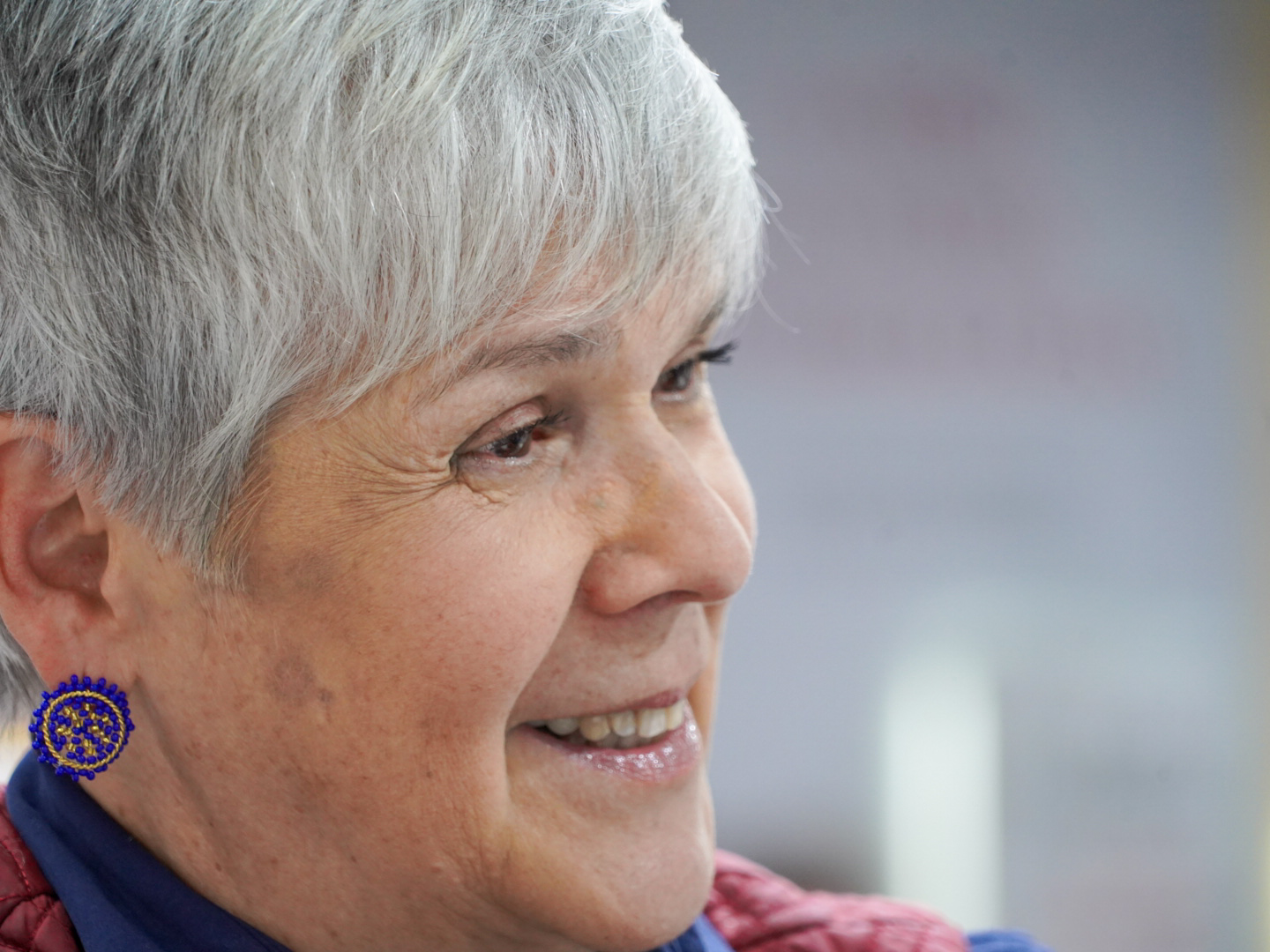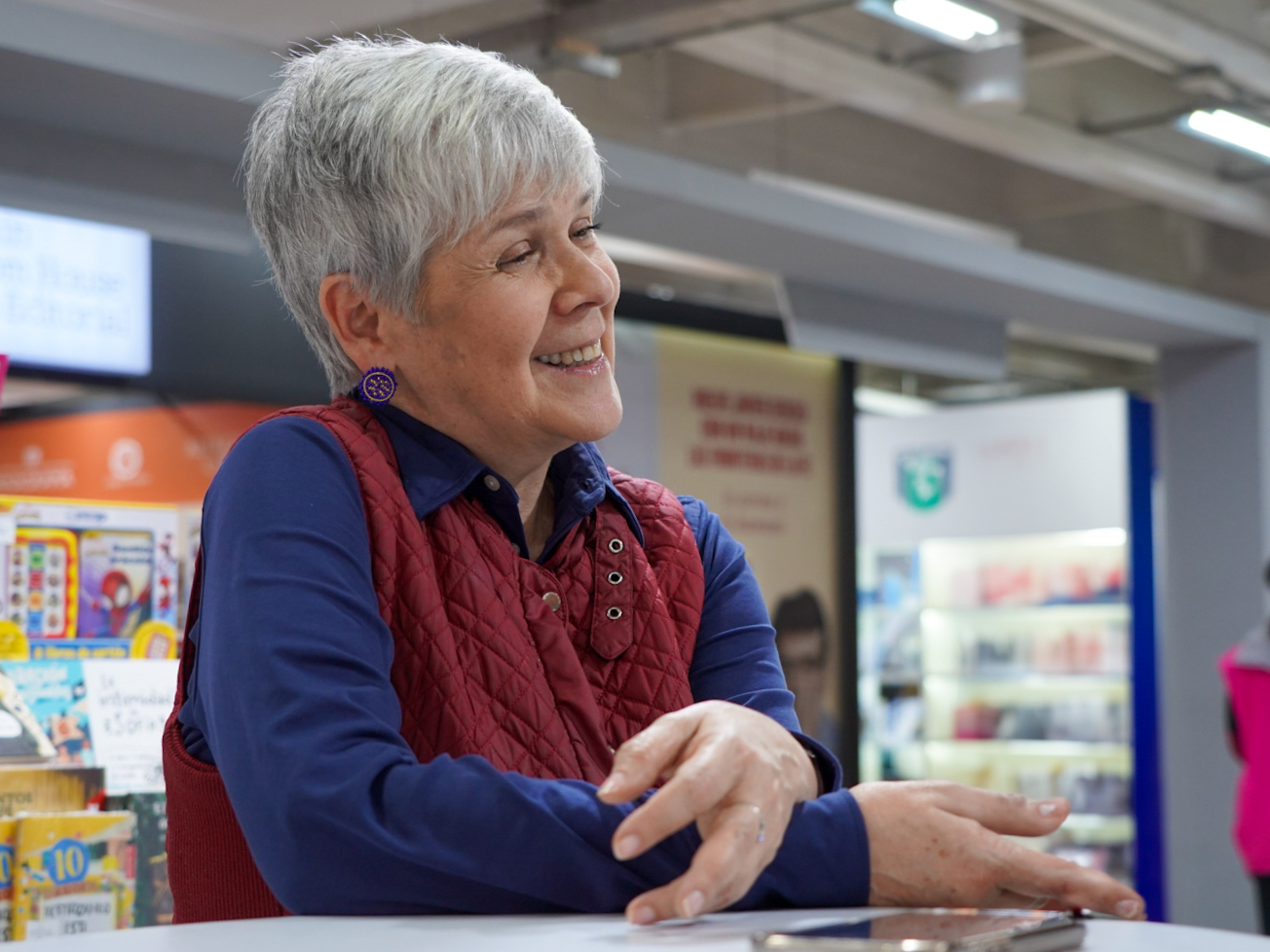From lyrics to song: Ana Mercedes Vivas and her 'Bird's Heart'

Ana Mercedes Vivas leaves the legacy of her mother, Maruja Vieira, in each of her verses. She inhabits and sees the world with the poetic sensibility she learned while with her, and which, even in her absence, never leaves her. She is moved by her surroundings, the history of her country, and the memories of the home where she grew up. At 65, her eyes still shine with the wonder of a child.
In "Corazón de pájaro," her latest work, Vivas returns to the origins of poetry . She unites music, song, and writing into a single work. With musical production by Gabriel Cifuentes, she returns to the tradition of minstrels who sang stories with their voices. Between slow guitar chords and the author's intimate timbre, the verses come alive.
How was 'Bird's Heart' born?
It was born during the pandemic, in 2020. It aims to foster that dialogue I love between poetry and music. The poems are articulated with songs I've found. I've been, above all, a repertoire seeker. We put it back on social media because the book got a bit stuck during lockdown. It was incredibly important to give it a new lease on life. It has a website, a printed book, music on a CD, and social media. It's a multimedia version of the connection between poetry and song.
In your poems you talk about migration and travel. What specific experiences inspired your words?
I, first and foremost, am a journalist. I think my poetry is different from my mother's or that of many others, who have that infinite ability to name things as if it were the first time. My poems portray what happens and what impacts me. My work has required me to travel a lot, and sometimes alone. That's why I say my bird's heart is sometimes the only traveler.
Regarding migration, I'm struck by what surrounds me in terms of conflict, what's happening with migrants. I'm deeply concerned about how we don't give them names. That's why there's a poem that says, "Do we even know that her name is Yalán? Do we even know that they have so many names?" Because they're not a number, they're not a phenomenon; they're human beings, and we must name them and welcome them as such .

Ana Mercedes Vivas is a writer, journalist, and strategic communicator. Photo: Juan David Cuevas Camacho / EL TIEMPO
How did you transition from writing poems to singing and expressing them in a different way?
I don't sing them, I don't set my poetry to music. I try to find the connection between poetry and song. 'Sobre el Paraná' was born on a trip to a poetry festival in Iguazú. The boat captain said, "Look, the water here no longer has any fish; the dams have taken away the fish the communities need." My poem says, "There are no water hyacinths / they told me / they were taken away / by the dam and the wind."
Then I found a wonderful song by Jorge Fandermole called "Prayer of the Remanso," which is exactly that . There's a place in the Paraná River called Remanso Valerio, where there's a large Christ of the nets to whom the fishermen, faced with the fact that they can no longer find any fish, entrust their journey. The song says, "Christ of the nets, do not abandon us, and let your gifts enter the fishing nets." That's what I do: weave my own spoken poetry, not set to music, with songs I find. That's "Corazón de pájaro."
What is the value of this convergence between poetry and music, of recovering the literary tradition that comes from the minstrels?
I think we're currently a society that's more auditory than reading. So, just as you say, this started with the minstrels, from castle to castle. There were no books, and I want books to continue to exist, but if we're more auditory and more videographic than paper readers, then we have to find other ways to reach people, so they don't feel like it's not close. That's the answer. We have to adapt. That's why 'Corazón de pájaro' is multimedia.
Let's go to the title of the work, why 'Bird's Heart'?
The heart of a bird resembles that of a human, but it's very large compared to its body because it needs a lot of oxygen to beat its wings. I think that oxygen concentrates the fact that human beings, and especially Colombians, have to beat their wings very strongly to be able to fly in this country . We have many bird hearts, and I would like to support the flights of other artists, to share that we are not only a biodiverse country because we have an infinite variety of birds, but because we have people with bird hearts.
You've worked on many social processes, specifically with victims of the armed conflict. How does this fit with the essence of your journalistic work?
I think we have to be sensitive to what's happening to us and that poets, as Gabriel Celaya rightly said, have in poetry a weapon loaded with the future. I don't mean to say we necessarily have to be political, but there are positions we have to take. I have a position on women in war.
I was deeply impressed by Jineth Bedoya's resignation . I think now is not the time to remain silent. It can't be that an issue like this has to be abandoned because there's no justice, because we've watched her suffer for 25 years. It can't be. In the book, there's a poem about women of war in which I ask them how to weave, how to sew the unanswered questions together, because it can't be that we continue without answers.
I add the journalist, the strategic communicator who works on human rights issues, but above all, I add what's happening around me. Then, you begin to realize that everything, in some ways, remains the same, and that needs to be acknowledged.
READ ALSO

Many of your poems have names of places, of physical geography and also emotional geography, what role do these places play in poetry?
It's still the role of a travel writer. Writing when I travel alone is a way of keeping me company. Telling where I've been isn't the important thing; it's what I find, what kind of human being I encounter.
Children also worry me a lot. I have a poem in "Between the Back and the Wall" called "Brand Name Shoe," in which I talk about buying some shoes, and they have a mistake. I wonder, is there a child in a factory who made a mistake? What happened? What's behind this?
What was it like growing up under the legacy of a poet mother?
It was very complicated. Besides, Maruja's bar was very high, but on the other hand, there's a Maruja who was the one who educated me to navigate life. She taught me something very important since I was a child. I could have been in a stratum-six all-girls school where I had one world, but she taught me another.
Maruja was given my father's position at the Sena (National Seminary of Education) when he died, so since she was assigned to Valle Cauca, Nariño, and the fishing center of Buenaventura, I was already familiar with the chieftains of Putumayo at ten, and by eight I was herding sheep in Nariño. I had a very mixed life. Maruja taught me about poetry, yes, but the kind of poetry that takes a stand—Maruja also had a very strong one . Perhaps with a much more refined poetic approach than mine.

Ana Mercedes Vivas, author of "Bird's Heart." Photo: Juan David Cuevas Camacho / EL TIEMPO
How do you see the social responsibility of the artist?
It's not an obligation to have a position, but if there isn't one, it's a matter of sensitivity. You can't be isolated from the world. I believe we have tasks we can fulfill, some greater than others. I dream that, if we poets want to do something for people in conflict, everyone should adopt someone among the people in conflict, look for children who are writing, young people who are writing. Let's take the time, let's get out of the ivory tower.
READ ALSO

What happened on Friday, May 2, at the Bogotá International Book Fair?
Together with maestro Juan Rochon, we're presenting a project I've been developing for many years, working with other guitarists. It's called 'Cantar la poesía' (Singing Poetry). Its origins are very charming and fun. When I was little, being the daughter of two poets, people would say, "Oh, what a pretty girl! She's already writing poetry." And I would think, "Lady, I'm making little sticks and balls."
There were additional things that made me dislike poetry. I didn't like it because my mother cried thinking about my father's death, who died before I was born. My mother recited and cried, and I didn't like that. But the Ecuadorian nanny I had, a wonderful indigenous Otavalo woman, taught me to sing.
When I was 11, Maruja said, "I'm not going to force poetry on this girl," and gave me Serran's albums. From then on, I've done research that continues to mature and expand with the things I cover about songs that are poetic texts.
LAURA SOFÍA VALENCIA BALLÉN - IT'S NOT TIME TO BE SILENT / EL TIEMPO MULTIMEDIA JOURNALISM SCHOOL
SOFIA ISAACS GUERRA - IT'S NOT TIME TO BE SILENT
eltiempo





